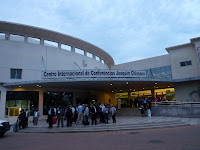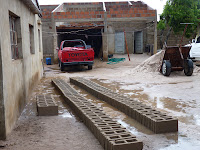By IFAD Reporters: Mattia, Antonella, Silvia, Judith, Soma and Luisa
The Global Gathering has come to an end. Over five intense days, there was rich discussion and experience sharing, as well as some important decisions, not to mention unexpected difficulties but the enthusiasm never wavered…

In what was supposed to be the dry season, but a series of unseasonal downpours (climate change in action?!) enlivened the programme and in the true spirit of pastoral adaptability to unpredictable environments, the organizers managed to move 200 people from Mera Village to a safer place in a matter of hours and with good mood.
Despite all this, and intense sessions during the days, the Gathering participants still could not resist animating the misty night with songs and dances making even more unique this event.

On the first two days, the participants organized themselves into working groups to discuss thematic areas relevant to them, including natural resource management, conflict management, climate change, women’s health, communication and media, traditional governance, education and human rights, and - last but not least - advocacy and the role of men in the empowerment of pastoral women. They identified common challenges and their vision for the future.
It was particularly interesting to hear the ‘men’s group’ discussing the challenges faced by women. “They work more than us”. they admitted, and “women empowerment has to start in the families”, so they outlined limitations faced within their own societies, from owning property to participating in decision-making processes. The relative lack of free time of women was also recognized a possible constraint in their productive potential. In other words, if women had more time they could engage in income generating activities such as handicraft production and marketing. Early marriage and inability to own land were identified as two further barriers to women’s empowerment – although one group member felt that communal rather than individual land ownership was more empowering for women. Lastly, the group acknowledged that domestic violence took place and actions are needed to face this bad phenomenon. This group agreed that first steps should be taken at household level, and that they themselves would try to share the workload more equally. They hoped that it would also give women the time and energy to start to take part in decision-making processes outside the home. They would give their wives greater voice in deciding on domestic issues including on financial issues, and their girls an education - and try to sensitize men and women about the issue of domestic violence.

Despite the many challenges faced by women, they are immensely resourceful in finding ways to meet the household’s basic needs, often ahead of their own. This important role played by pastoral women is only marginally recognized. Increasing awareness of women’s concerns and valuing their unique inputs is a step towards strengthening their role in pastoral communities, and reducing their vulnerability to external shocks.
Another working group looked at how to add value to their products and improve access to markets as a crucial step towards a sustainable economic empowerment of pastoral women. In Mongolia, they identified lack of quality control to ensure consistency of production, lack of storage capacity of raw materials, insufficient and out-of-date technical equipment and lack of access to international markets as key constraints. Added to this there are practical difficulties associated with nomadic tribes, with whom it is much harder to communicate. This group identified the possibility of setting up a well-publicized central support unit, to which pastoral women and their communities would have access. The functions of such a unit would include quality control, storage of raw materials to ensure year-round capacity to respond to orders, training, common packaging and technical equipment, and sustainability could be ensured by asking a small contribution from users.
Then the attention was focused on action planning and at the end resulted in the ‘Mera Declaration of the Global Gathering of Women Pastoralits”, a milestone call to action by pastoral women and men. Drafted over intense hours of debate by geographical representatives mandated by their groups to represent them, the historic declaration called for greater recognition of pastoralism as a sustainable and valuable way of life and for specific policy support.
This experience has come to an end, but there is a lot that we will keep with us: from the smile of the organizer, Lalji and the energy of his people that never waned even in difficult circumstances, to the work of all the volunteers and above all to the pastoral women who with their warmth and commitment made this event really unique!

Mera Declaration of the Global Gathering of Women PastoralistsWe, the women pastoralists gathered in Mera, India, from November 21-26, 2010, representing 32 countries, have met to strengthen alliances and forward practical solutions to issues that affect us.
We are part of a world-wide community of pastoralist peoples that is 300 million strong. We pledge that we will continue to live in a way that is environmentally sustainable and protects biodiversity and common resources for generations to come. We will continue to network and share our best practices and lessons learned to build capacity amongst ourselves and the global community.
We experience firsthand the leading edge of climate change and its associated problems, and we have much to share with the world about adaptation, mitigation and living sustainably on planet earth. Recently, pastoralists have been increasingly vocal at the international level but, as women, our voices have yet to be fully heard. We have unique and equally valuable contributions to make to our own communities and the global community.
We experience firsthand the leading edge of climate change and its associated problems, and we have much to share with the world about adaptation, mitigation and living sustainably on planet earth. Recently, pastoralists have been increasingly vocal at the international level but, as women, our voices have yet to be fully heard. We have unique and equally valuable contributions to make to our own communities and the global community.
We will work with men to build strong and equitable pastoralist societies and we will contribute to greater social equality within our families, our communities, our countries and around the world.
We present this declaration as a guiding political document to inform and support the development of pastoralist policies.
We call on governments, governing agencies of the United Nations, other relevant international and regional organizations, research institutes and our own customary leaders to support us and to:
1.RECOGNISE the essential role of pastoralists in global environmental sustainability, including the conservation of biodiversity, mitigation of climate change and combating desertification.
2.ENSURE the equal rights of pastoralist women and recognize their key role in society. This includes the recognition of the work of women pastoralists as a valid profession and as a fundamental component of pastoralism.
3.RECOGNISE pastoralist mobility as a fundamental right.
4.ENSURE and defend pastoral access to resources, including our traditional grazing lands.
5.PROTECT the rights of pastoralists and provide security in nomadic areas including the enforcement of laws that guarantee the safety of women.
6.RECOGNISE pastoralists who identify as indigenous and respect the UN Declaration on Indigenous Rights.
7.MONITOR the development and implementation of policies affecting and protecting pastoralists.
8.SUPPORT the development of an international organization in charge of considering complaints about violations of pastoralist rights. This organization needs the ability to hold countries accountable and should include pastoralist women as members.
9.ADAPT existing legislation to take into account the specificities of pastoralist ways of life and differentiate nomadic and transhumant pastoralism from intensive livestock production.
10.PROMOTE regional policies and treaties that take into account trans-border pastoralism and respect traditional grazing territories and migratory patterns. These are to be negotiated in consultation with pastoralist women.
11.DEVELOP specific policies that promote the sustainability and welfare of pastoral ways of life and the ecosystems we rely on for survival. The policy-making process must include meaningful participation, and consultation, with pastoralist women.
12.DEVELOP legislation that restricts development that harms or threatens pastoralist livelihoods.
13.ALLOW year-round access to grazing lands, including some lands that are currently within wild life preserves and conservation areas. These grazing spaces are to be established in consultation with pastoralist women.
14.PROMOTE and recognize Indigenous Community Conservation Areas (ICCAs).
15.ENSURE proportionate representation of pastoralist women in all levels of governance.
16.RESPECT the right of pastoralist women to education, both formal and informal, and including secondary education. Provide support to shift perceptions around the full educational needs of girls.
17.DEVELOP accessible and appropriate programmes for pastoralist children to access education. Special emphasis is to be given to pastoralist girl children. These are to be developed in consultation with pastoralist women.
18.DEVELOP mobile facilities that respect pastoralist realities and are in line with the needs of pastoralist women.
19.DEVELOP and implement programmes that support women’s health in pastoralist communities. Information and training on health, particularly reproductive health, should be given priority.
20.CREATE and support programmes that promote the economic development and diversify economic opportunities for pastoralist women, including micro-credit financing. These programmes must be developed in consultation with pastoralist women.
21.SUPPORT pastoral women through capacity building, including direct access to markets and training to improve the quality and marketability of their work and managerial skills.
22.SUPPORT training programmes focused on leadership and communication to enable pastoralist women to effectively participate in negotiations in all issues affecting their ways of life.
23.SUPPORT and fund research into new technologies that further improve the efficiency and environmental sustainability of pastoralist ways of life. These technologies should be attuned to the needs and realities of pastoralism and should take advantage of renewable and easily accessible natural resources.
We women pastoralists want our children, and our children’s children, to have the tools and opportunities they need to adapt to the realities and changing conditions of the modern world while retaining their traditional cultural legacies and lifestyles.
This is our right and it is by remaining pastoralists that we can be of greatest service to the entire human community.

 On Monday 6, December during an international conference on food security at Chatham House in London, IFAD will launch the Rural Poverty Report 2011: New realities, new challenges: new opportunities for tomorrow’s generation.
On Monday 6, December during an international conference on food security at Chatham House in London, IFAD will launch the Rural Poverty Report 2011: New realities, new challenges: new opportunities for tomorrow’s generation.




























